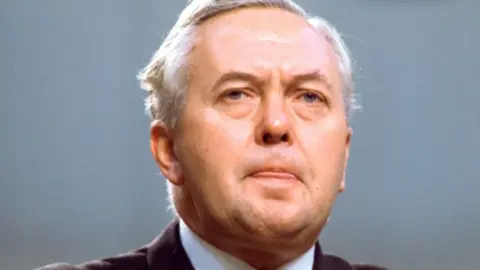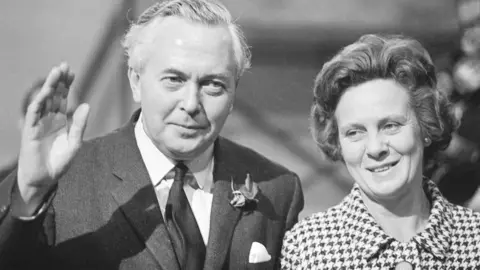 PA
PAFormer Prime Minister Harold Wilson agreed late in life to sell his entire archive of personal and political papers to help fund his care, according to documents released by the National Archives.
Lord Wilson initially planned to sell the collection to McMaster University in Canada for £212,500 – about £700,000 in today’s money.
He was suffering from Alzheimer’s and required “continuing care, the costs of which are heavy and will increase”, according to one document.
However, the proposal to sell the papers abroad prompted alarm among senior officials in Margaret Thatcher’s government.
In early January 1990, the Cabinet Secretary Sir Robin Butler wrote to another official, alerting her that Lord Wilson’s former secretary, Lady Marcia Falkender, was “orchestrating a proposal” to set up an archive for the former prime minister’s papers in Canada.
Part of the proceeds would support Lord and Lady Wilson who were “now not well off”, as reported to Sir Robin by his predecessor Lord Armstrong.
There was “no enthusiasm” for the sale among officials in the Cabinet Office, according to the files, with one pointing out that Lord Wilson’s papers were still subject to the so-called 30-year rule.
Government papers are transferred to the National Archives, but remain closed to the public for a period of time before being eligible for release – 30 years in the 1980s, although that has since been shortened to 20 years.
Episodes from Wilson’s times could still have been sensitive at the time of the proposed sale. Only a few years earlier, Mrs Thatcher had tried to stop the publication of a book claiming MI5 plotted against the Labour PM.
Had the Wilson papers been sent to Canada, the 30-year rule could not have been enforced, according to officials.
‘Not really his to sell off’
McMaster University wanted the archive to include papers from Lord Wilson’s time at Number 10. The Labour leader had served two terms as prime minister, from 1964 to 1970 and then between 1974 and 1976.
Sir Robin thought it would cause “public disquiet” if the papers left the country. Andrew Turnbull, Mrs Thatcher’s principal private secretary, said he was unhappy with the “politics/morality” of such an idea.
“Although these are formally Lord Wilson’s private papers”. he wrote in March 1990, “they are part of our history, and, it will be said, they are not really his to ‘sell off'”.
He said if Lord Wilson required additional care in his old age, the Labour and Trade Union movement should support him.
 Getty
GettyNonetheless, that summer the cabinet secretary explored ways to support Lord and Lady Wilson. He wrote that “the case of a former prime minister fallen on hard times in this way seems a very sad one”.
He was told the “special funds” available to the current prime minister could not help. He then tried the Parliamentary Pension Scheme, to see if its Hardship Fund could assist. A government briefing note also suggested raising the pension for former prime ministers.
However, the rise proposed was just £5,000 per year.
Lord Armstrong had been helping Lady Falkender. In November 1990 she told him the Wilsons were “delighted” to hear of the pension rise, which would “clearly help in their day-to-day lives”.
But the sum was “not in any way comparable” to that being offered by the Canadian university.
A solution is found
Lord Armstrong had suggested it would be “unseemly” for the papers to leave the country.
Lady Falkender responded: “There has been too much suffering of one kind or another for ‘seemliness’ or ‘unseemliness’ to enter into it any more.”
She said the money from the papers would be “helpful” just as the sale of “a house, a piece of art, or a diamond brooch might be”.
The Cabinet Office was told there was no legal obstacle to the sale.
But by July 1991, an alternative solution had been reached. The Trustees of the Wilson Archive had found anonymous donors, who would fund the Bodleian Library in Oxford buying the papers.
The money would go to the trust set up for the Wilsons’ benefit.
They would stay in the UK – and in a secure location. Before then, Lord Wilson had been storing his archive in the basement of the National Car Parks building in central London, thanks to the company chairman, one of his “loyal supporters”.
Lord Wilson died in 1995, aged 79.

